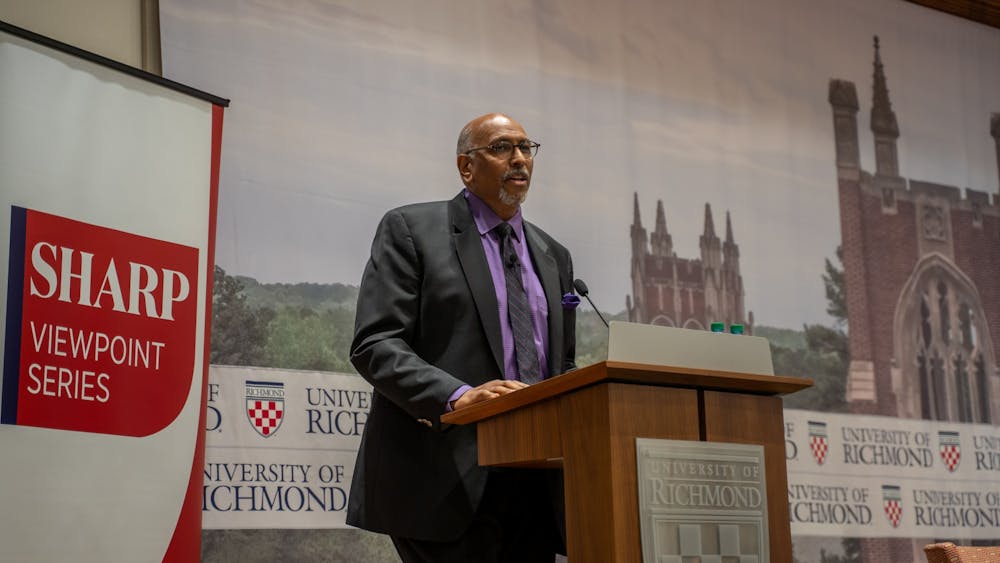Former Republican National Committee Chairman Michael Steele talked about the Republican party and the future of the "American Dream" as part of this year's Sharp Speaker Series.
Steele, an MSNBC contributor, spoke in the Queally Center Tuesday at 7 p.m.
University of Richmond President Ronald A. Crutcher introduced Steele.
“I believe it is critically important that we have candid conversations about these topics,” Crutcher said. “Not only because I worry that the nation’s social fabric is fraying, but also because as you know we face our own challenges here at home, as underscored by the recent state of racist and xenophobic incidents here on campus.”
Crutcher denounced the incidents and praised students for holding various forums to push for a more inclusive community.
When discussing his introduction to the Republican party, Steele talked about his background as an African American growing up in Washington, D. C. He said he resonated with the Republican Party’s foundational relationship with African Americans, talking about its role in the abolition movement and it being the "party of Lincoln."
Steele also noted the parties’ responses to events such as the Vietnam War, Watergate and recessions at the time he came of age, shaping his allegiance.
“It just fit,” Steele said of his decision to be a Republican.
Steele said he had prayed to God and had asked if he should serve the people in a “religious habit or business suit," claiming he would have been a priest if God had intended another path for him.
Steele connected taking responsibility for his actions to the idea of tribalism, saying that this can be found on both the right and the left. He asked people to be true to themselves.
“Our politics today have become a lot like a rash,” Steele said as the audience laughed. “A rash may prove inconsequential, or in the case of our current political climate, it may be a symptom of a malady that’s much more serious, with consequences that could lead to permanent scars.”
The 2016 election upset him because it was a shift from American aspirationalism, Steele said.
Enjoy what you're reading?
Signup for our newsletter
“That election was more about what pissed us off,” Steele said.
Steele said the aspirationalism found in the American Dream can be found in the Declaration of Independence, which he quoted numerous times. He said that despite controversies with historical context, the defining goals the Declaration outlined are things the country has now lost sight of.
He highlighted important figures including Frederick Douglass and Rosa Parks, noting that they fought and sacrificed for the freedom to pursue the American Dream.
“What does the American Dream mean for you in these times?" Steele asked the audience. "How much has that dream changed for you as America has changed and continues to change?”
Steele said that leaders who were reluctant but prepared to lead and willing to follow others were needed today. He said they need to put those they serve over their office, respecting the American Dream.
Steele ended by asking students in the audience what they were willing to sacrifice to keep the American Dream alive.
T.C. Williams Law School professor Kevin Woodson moderated audience questions.
When addressing questions about political polarization today, Steele said he understood the depth of the issue firsthand.
Steele said that the polarization was collectively everybody’s fault. The people are the government, as said in the phrase, “We the people," and therefore the public will decide when polarization of politics is over, Steele said.
Steele called for more attention to current bipartisan efforts, and even quoted Barack Obama at one point. His joking about using a quote from Obama as the former chairman of the RNC prompted more laughter from the audience.
When asked about President Donald Trump’s leadership, Steele said the president perpetuated theatrics in office and a “reality TV” government. He said certain standards had disappeared, saying he thought it was below the position of the Office of the Speaker for Nancy Pelosi to rip Trump's speech at the end of this year’s State of the Union address.
Despite this, Steele praised her, saying he understood and applauded her decision.
“Right now she is the only political operative, the only politician in Washington that actually knows how to get into Trump’s head and to get into it effectively," Steele said. "What she did was a very effective way to do that.”
Steele said Trump took advantage of a divide in the Republican party over its future and the meaning of conservatism that came after Reagan’s presidency, simply adding another layer on top of the divide.
Steele likened himself to a “Motel 6” when asked why he remains in the party, saying that somebody has to “keep the lights on." He clarified he does not feel that the Republican party represents him right now.
As a member of the media now, Steele criticized its role in 2016, blaming the media’s attention on Trump for ratings and monetary reasons.
“The country paid a dear price,” Steele said of the media’s decisions.
Glen Allen resident Beth Dickerson said she had decided to attend the event because Steele seemed very honest.
“He’s very straightforward in how he says things,” Gary Dickerson said. “You can have a conversation with him, where today, if I have a conversation it seems to be a battle."
Contact news writer Eileen Pomeroy at eileen.pomeroy@richmond.edu.
Support independent student media
You can make a tax-deductible donation by clicking the button below, which takes you to our secure PayPal account. The page is set up to receive contributions in whatever amount you designate. We look forward to using the money we raise to further our mission of providing honest and accurate information to students, faculty, staff, alumni and others in the general public.
Donate Now



